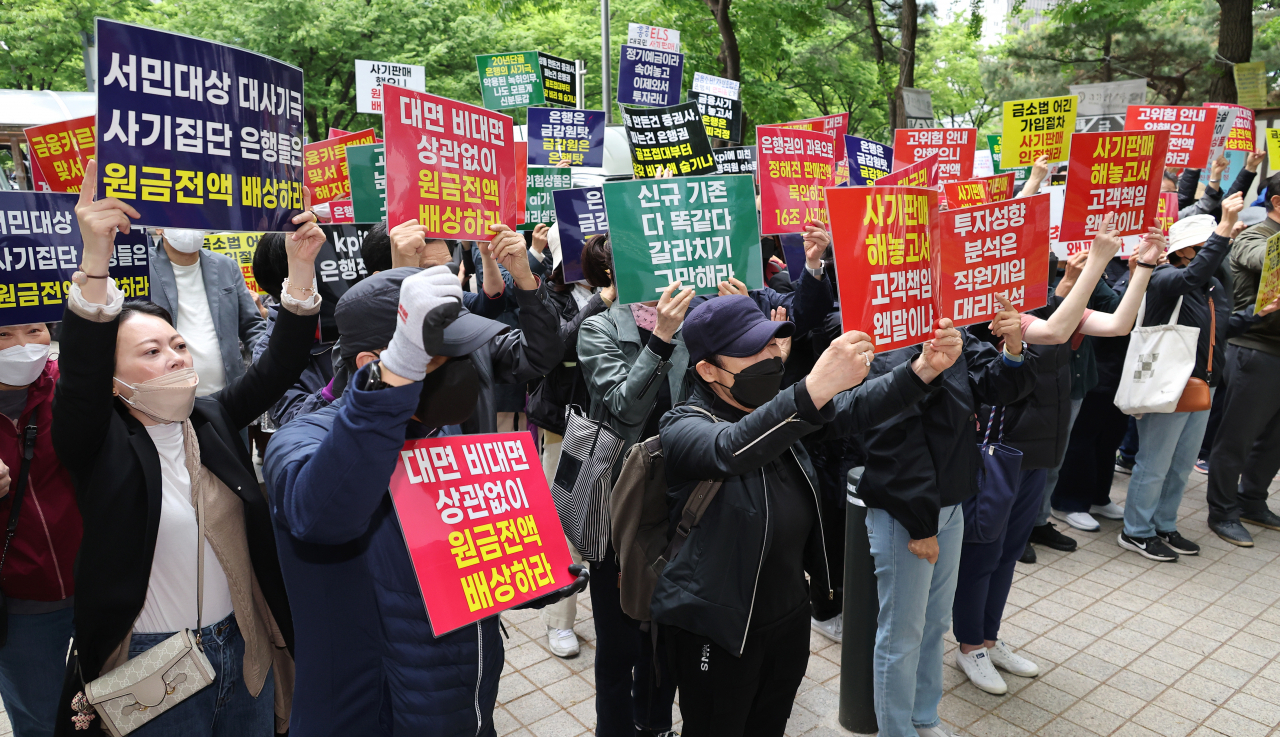[KH Explains] Hong Kong rally spurs hope for ELS loss mitigation
ELS products maturing from July onwards set to avoid losses if HSCEI reaches 7,500
By Choi Ji-wonPublished : May 21, 2024 - 17:59

Hong Kong stocks surged to a 10-month high Monday, continuing a bullish rally and sparking hopes of South Korea's recovery from significant losses tied to equity-linked securities tracking the Chinese index.
The Hang Seng China Enterprises Index, tracking major Chinese stocks on Hong Kong's main bourse, reached an annual high of 6,954 on Monday, setting daily records. The following day, it opened slightly lower at around 6,909, but this was still 38 percent up from January's annual low of 5,001.
Since April, the HSCEI has been on a steady incline following the Chinese government's announcement of measures aimed at enhancing the stock market, which included issuing 1 trillion yuan ($138 billion) in ultra-long-term treasury bonds to stimulate the economy. Surpassing 6,500 earlier this month, the index has maintained its upward trajectory.
"The HSCEI has outperformed other major global stock markets this year," noted Juhn Jong-gyu, a senior analyst at Samsung Securities, adding, "This remarkable turnaround from early-year panic selling, driven by concerns about economic weakness and debt risks, can be attributed to a blend of government policy adjustments and strategic valuation decisions."
Market observers predict that continued upward momentum in the index may alleviate losses for domestic investors in HSCEI-linked ELS products. Those who have invested in products maturing in August are poised to avoid losses should the index remain above 7,000. Further bolstering of this bullish trend could shield July maturing products from losses if the index surpasses 7,500, and June maturing products if it exceeds 8,000.
According to data from the Financial Supervisory Service, the total outstanding amount of HSCEI-linked ELS products sold by local banks, maturing between April and the year-end, stands at approximately 10 trillion won ($7.33 billion).
Should the Hong Kong H-Share Index surpass 7,000, anticipated losses for the six banks selling ELS next month are estimated at 439.3 billion won, a 45 percent reduction from the projected losses of 7,992 billion won when the index was at the 6,500 level.
As of last week, domestic banks revealed an average loss rate of 47.4 percent from ELS maturation, translating to confirmed losses of about 3.16 trillion won out of a total maturation amount of 6.66 trillion won.
Major banks are presently in voluntary negotiations with clients who incurred losses under these circumstances. In a recent dispute resolution committee meeting, the FSS proposed compensation rates ranging from 30 to 65 percent for representative cases. Banks have already allocated approximately 1.8 trillion won for ELS loss compensation as part of first-quarter provisions.
A group of retail investors, accusing banks of misselling high-risk products, are demanding full refunds for their losses and are preparing for class-action lawsuits.
Analysts expect the rally in the Hong Kong stocks to persist for some time.
"A slowdown in other markets, like the US, combined with ongoing expectations regarding Chinese policies, may create a fear of missing out, potentially driving gains in HSCEI to 7,500," said Cui Xuehua, an analyst at Meritz Securities.
For similar reasons, Hana Securities researcher Kim Kyung-hwan adjusted the HSCEI forecast band to 6,045 to 7,750, while Samsung's Juhn raised his target to between 7,500 and 7,600.
However, in the long term, experts cautioned that the rebound could face constraints due to ongoing instability in China.
"We don't anticipate the upward trend continuing indefinitely. Fundamental improvements are necessary for sustained growth, but currently, the Chinese economy presents a mixed picture," explained Cui.
Juhn characterized the current surge in stock prices as a "valuation rebound," which will slow down once it regains the discounted value. "To amplify this, stronger government policies and increased liquidity from mainland China are required," he added.











![[Graphic news] S. Korea's children get taller](http://res.heraldm.com/phpwas/restmb_idxmake.php?idx=644&simg=/content/image/2024/06/02/20240602050186_0.gif&u=)








![[Today’s K-pop] Kep1er vows to keep going with 1st LP](http://res.heraldm.com/phpwas/restmb_idxmake.php?idx=642&simg=/content/image/2024/06/03/20240603050651_0.jpg&u=)